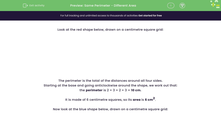Look at the red shape below, drawn on a centimetre square grid:
The perimeter is the total of the distances around all four sides.
Starting at the base and going anticlockwise around the shape, we work out that:
The perimeter is 2 + 3 + 2 + 3 = 10 cm.
It is made of 6 centimetre squares, so its area is 6 cm2
Now look at the blue shape below, drawn on a centimetre square grid:
The perimeter is the total of the distances around all its sides.
Starting at the base and going anticlockwise around the shape, we work out that:
The perimeter is 1 + 1 + 1 + 2 + 1 + 1 + 1 + 2 = 10 cm.
This is the same perimeter as the red shape above.
But it is only made of 4 centimetre squares, so its area is only 4 cm2
Can you see that shapes with the same perimeter can have different areas?

Let's try some questions.








